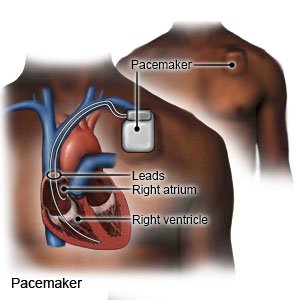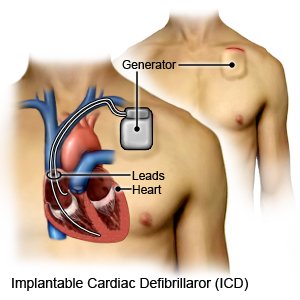Myocarditis
Medically reviewed by Drugs.com. Last updated on Aug 4, 2025.
What is myocarditis?
Myocarditis is inflammation of the heart muscle (myocardium). The myocardium pumps blood through the heart and to other parts of the body. Myocarditis can damage the heart muscle. This weakens the heart and makes it work harder. Over time, this may cause your heart to enlarge, lead to heart failure, and become life-threatening.
What increases the risk for myocarditis?
- Viral, bacterial, fungal, or other infections
- Alcohol or illegal drugs
- Autoimmune conditions such as diabetes mellitus, lupus (SLE), or sarcoidosis
- Medicines such as antibiotics, vaccines, or antidepressants
- Chemotherapy or radiation therapy
- Toxins such as arsenic, lithium, or lead
- Snake bites or insect stings
What are the signs and symptoms of myocarditis?
Signs or symptoms may appear suddenly or develop gradually over hours or days. You may have any of the following:
- Chest pain or tightness
- Feeling like your heart is beating faster than usual
- Trouble breathing
- Feeling dizzy or faint
- Fever, joint, or muscle pain
- Fatigue (being mentally and physically tired) and getting tired easily
How is myocarditis diagnosed?
Contrast liquid may be used before certain tests. Tell the healthcare provider if you have ever had an allergic reaction to contrast liquid.
- Blood tests may show inflammation or damage to your heart muscle.
- An EKG records the electrical activity of your heart. It is used to check for abnormal heart rhythm.
- An echocardiogram is a type of ultrasound. Sound waves are used to show the structure and function of your heart.
- X-ray or MRI pictures will show the size of your heart and check for inflammation. These tests can also check if you have fluid around your heart or lungs. You may be given contrast liquid before the pictures are taken to help providers see the pictures clearly. Do not enter the MRI room with anything metal. Metal can cause serious injury. Tell the provider if you have any metal in or on your body.
- Nuclear imaging may be used to check for inflammation and damage to your heart. Radioactive dye is injected into a blood vessel to help providers see the pictures clearly.
- Cardiac catheterization is a procedure that uses an x-ray and contrast liquid to check your heart and the blood flow in your arteries. A tube is threaded to your heart through a blood vessel in your leg or arm. Contrast liquid may be given to help arteries show up more clearly.
- A biopsy is a procedure used to remove a small piece of your heart muscle tissue. The muscle tissue is sent to a lab for tests.
How is myocarditis treated?
In addition to medicines, your healthcare provider may recommend a procedure or surgery. Ask for information about each treatment:
- Medicines may be given to lower your blood pressure and strengthen or regulate your heart rate. You may also need medicine to decrease pain or excess fluid in your body. Medicine may also help to treat an infection or prevent your immune system from attacking your heart.
- A pacemaker is a device that helps your heart beat at a regular rate and rhythm. The pacemaker monitors your heart rhythm. If your heart does not beat as it should, the pacemaker sends small electric signals to your heart.

- An implanted cardioverter defibrillator (ICD) is a small device that monitors your heart rate and rhythm. If your ICD senses that your heart is not beating correctly, it will give it a small electrical shock. This helps your heart to beat regularly again.

- Heart transplant surgery may be needed if your condition is severe. During a heart transplant, your damaged heart is removed and replaced with a healthy heart from a donor.
How can I manage my symptoms?
- Limit physical activity. Your healthcare provider may suggest that you rest until your symptoms decrease. Your provider may suggest that you avoid heavy lifting or certain physical activities. Ask which activities are safe for you, when to begin exercise, and the best exercise plan for you.
- Eat a variety of heart-healthy foods. Heart-healthy foods are high in potassium, calcium, magnesium, and fiber. These nutrients are added when you eat more fruits, vegetables, and whole grains. Heart-healthy fats can be found in walnuts, salmon, and canola or soybean oil. Limit foods high in sugar, saturated and trans fats, and total fat.

- Limit sodium (salt) as directed. Too much sodium can cause swelling and make your symptoms worse. Ask how much sodium you can have each day. Pay attention to sodium content on food labels.

- Do not drink alcohol, smoke cigarettes, or use drugs. Alcohol, cigarettes, or illegal drugs can damage your heart and worsen your symptoms. Ask for information if you currently use any of these and need help quitting.
What can I do to prevent an infection?
 |
- Wash your hands often. Wash your hands several times each day. Wash after you use the bathroom, change a child's diaper, and before you prepare or eat food. Use soap and water every time. Rub your soapy hands together, lacing your fingers. Wash the front and back of your hands, and in between your fingers. Use the fingers of one hand to scrub under the fingernails of the other hand. Wash for at least 20 seconds. Rinse with warm, running water for several seconds. Then dry your hands with a clean towel or paper towel. Use hand sanitizer that contains alcohol if soap and water are not available. Do not touch your eyes, nose, or mouth without washing your hands first.

- Cover a sneeze or cough. Use a tissue that covers your mouth and nose. Throw the tissue away in a trash can right away. Use the bend of your arm if a tissue is not available. Wash your hands well with soap and water or use a hand sanitizer.
- Avoid crowds and sick people. This will reduce your risk for infection.
- Do not share items. Do not share towels, razors, or toothbrushes with other people. Avoid sharing utensils, drinks, and food.
- Clean surfaces often. Clean doorknobs, countertops, cell phones, and other surfaces that are touched often. Use a disinfecting wipe, a single-use sponge, or a cloth you can wash and reuse. Use disinfecting cleaners if you do not have wipes. You can create a disinfecting cleaner by mixing 1 part bleach with 10 parts water.
- Ask about vaccines you may need. Certain vaccines can help protect you from infections that can cause serious illness in a person who has myocarditis. Your healthcare provider can tell you which vaccines are right for you. Your provider can also tell you if you should get vaccines not listed below, and when to get them.
- COVID-19 vaccines are given to adults as a shot. At least 1 dose of an updated vaccine is recommended for all adults. COVID-19 vaccines are updated throughout the year. Adults 65 or older need a second dose of updated vaccine at least 4 months after the first dose. Your healthcare provider can help you schedule all needed doses as updated vaccines become available.
- Ask your healthcare provider about the flu and pneumonia vaccines. All adults should get the flu (influenza) vaccine as soon as recommended each year, usually in September or October. The pneumonia vaccine is recommended for all adults aged 50 or older to prevent pneumococcal disease, such as pneumonia. Adults aged 19 to 49 years who are at high risk for pneumococcal disease should also receive the vaccine. You may need 1 dose or 2. The number depends on the vaccine used and your risk factors.
Call your local emergency number (911 in the US) if:
- You have any of the following signs of a heart attack:
- Squeezing, pressure, or pain in your chest
- You may also have any of the following:
- Discomfort or pain in your back, neck, jaw, stomach, or arm
- Shortness of breath
- Nausea or vomiting
- Lightheadedness or a sudden cold sweat
When should I seek immediate care?
- Your heart is beating faster than usual, fluttering, or jumping in your chest.
- You are tired and cannot think clearly.
- You have increased swelling in your legs, ankles, or feet.
When should I call my doctor?
- Your signs and symptoms come back or get worse.
- You have a fever.
- You have chills, a cough, or feel weak and achy.
- You have questions or concerns about your condition or care.
Care Agreement
You have the right to help plan your care. Learn about your health condition and how it may be treated. Discuss treatment options with your healthcare providers to decide what care you want to receive. You always have the right to refuse treatment. The above information is an educational aid only. It is not intended as medical advice for individual conditions or treatments. Talk to your doctor, nurse or pharmacist before following any medical regimen to see if it is safe and effective for you.© Copyright Merative 2025 Information is for End User's use only and may not be sold, redistributed or otherwise used for commercial purposes.
Learn more about Myocarditis
- Atorvastatin (Lipitor): Top 12 Drug Facts You Need to Know
- Do blood pressure drugs interact with alcohol?
- Side Effects of Weight Loss Drugs
Treatment options
Medicine.com guides (external)
Further information
Always consult your healthcare provider to ensure the information displayed on this page applies to your personal circumstances.
